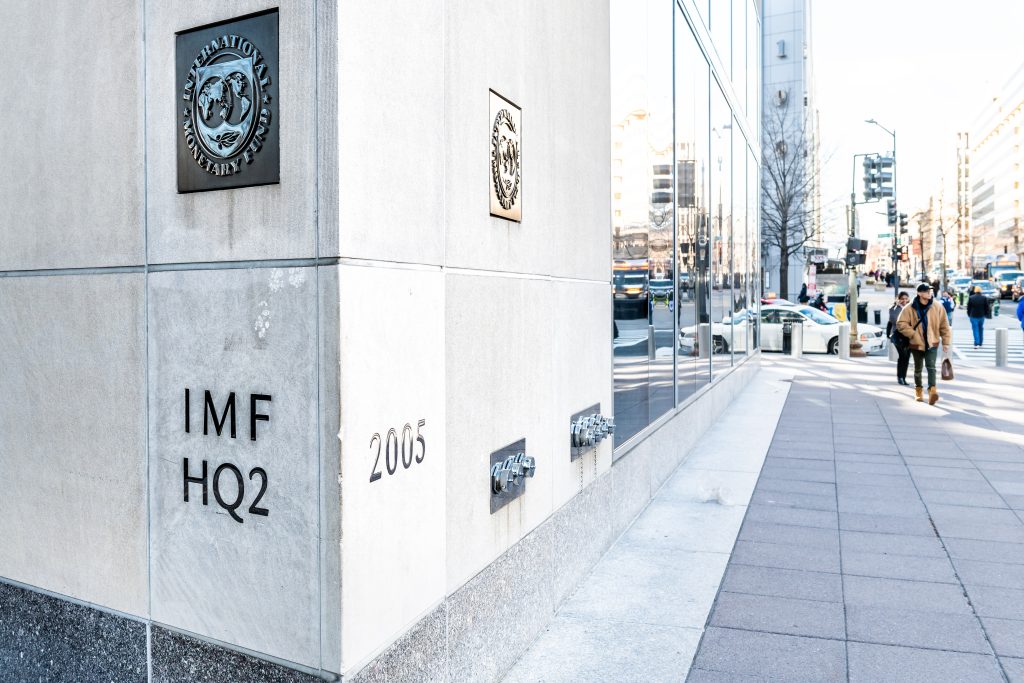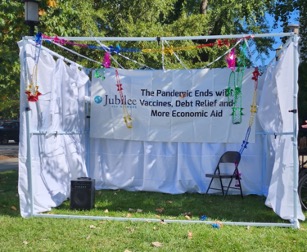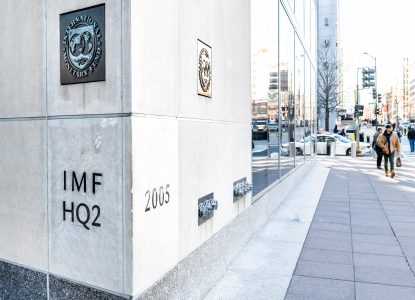By Katherine Marshall, G20 Interfaith Association Vice President, World Faiths Development Dialogue (WFDD), Berkley Center.
– – –
The intensive gatherings that are a continuing feature of Washington life – the annual meetings of the World Bank and the International Monetary Fund (IMF) – were back in force last week, in a “return to post-COVID-19 normal.” The finance world flooded in. Meeting after meeting, police escorts, receptions, and protesters were an eerily familiar scene.
As the meetings conclude, looking beyond formal statements, the spectators (me among them) scratch their heads and take stock: What new emerged? What happens next?

A Gloomy and Discordant Picture
The overall picture was rather gloomy, and the answer to the “what’s new” question was essentially “not much.” The deep and intersecting crises facing the policymakers gathered in central Washington seemed to weigh heavier than during other gloomy times in past memory.
There were constant reflections on the lists of challenges: hunger, wars (especially in Ukraine), inflation, climate disasters, food and famine, debt burdens, and, of course, the little-discussed but continuing realities and uncertainties of the COVID-19 pandemic. The optimists were few and far between.
The reason so much attention goes to these meetings is that so many who gather for them have resources and power to do something about the crises. They also have the responsibility to act. Apart from the IMF and the World Bank (both focusing sharply on old and new mechanisms to support action), two global leadership bodies, the G7 and the G20, were part of the scene. And much attention goes to them as the sources of so much potential influence, power, and money.
But geopolitics, notably the tensions around US, Russian, and Chinese relationships, stymied much of the discussion. A G20 finance ministers’ summary statement was issued, but the three-day delay in its appearance was read as a sign of discord. And a sobering comment from Sri Mulyani, Indonesia’s minister and leader as Indonesia chairs the G20 this year, conveyed the tone: “The World is in a dangerous condition.”
Faith Groups and the Vulnerable
The G20 Interfaith Forum (I serve as its Vice President) has urged the G20 leaders to keep their eyes squarely on the most vulnerable across the world: people and countries, as they navigate the crises. That is, to our minds, the central, urgent message of the world’s religious communities at this dangerous time.
At least some of the discussions focused on issues relevant to those who risk being left behind (or who are already far distant from security). Most obvious was the important (if frustratingly slow) efforts to address the looming challenges of debt burdens, aggravated by COVID-19 emergencies and now by inflationary pressures. But there was little concrete progress to report; the complex financial wheels grind slowly.

Jubilee USA, a group with roots in Biblical messages about compassion and “jubilee,” with its connotations of compassion and forgiveness, works along similar lines, and they brought their message to the Annual Meetings in a graphic way: Honoring the Jewish holiday by constructing a traditional Sukkah just outside the IMF and World Bank headquarters.
Their message was: “The Pandemic ends with Vaccines, Debt Relief, and More Economic Aid.” After a press conference and teach-in, there was a symbolic “breaking the chains of debt.” But it would be disingenuous to say that the effort met a maelstrom of support: just a few hardy souls who shared in the general gloom.
Changes Looking Forward
Global attention will move on, and the COP27 Climate meetings hosted by Egypt are fast approaching. The G20 Summit of leaders in Bali in mid-November is another focal point – where we will see once more how world leaders are acting at this critical time. But there are grounds for the cock-eyed optimists among us.
As the Washington meetings last week attest, there are countless challenges—but also a rich array of ideas about how to address them, and people, inside and outside the sites of power and resources, determined to do better. They come from all sectors—the extraordinary worlds of religious actors among them.
A disappointment (for me) in listening to many discussions last week was how little robust debate we heard. As we move on to the next events, let’s expect and hope for a richer engagement. Let’s hear more ideas and more experience. The dangerous times we face demand it.
– – –
Professor Katherine Marshall is a senior fellow at the Berkley Center for Religion, Peace, and World Affairs at Georgetown University. She serves as the vice president of the G20 Interfaith Association and executive director of the World Faiths Development Dialogue, and worked at the World Bank from 1971 to 2006, tackling development issues in the world’s poorest countries.


